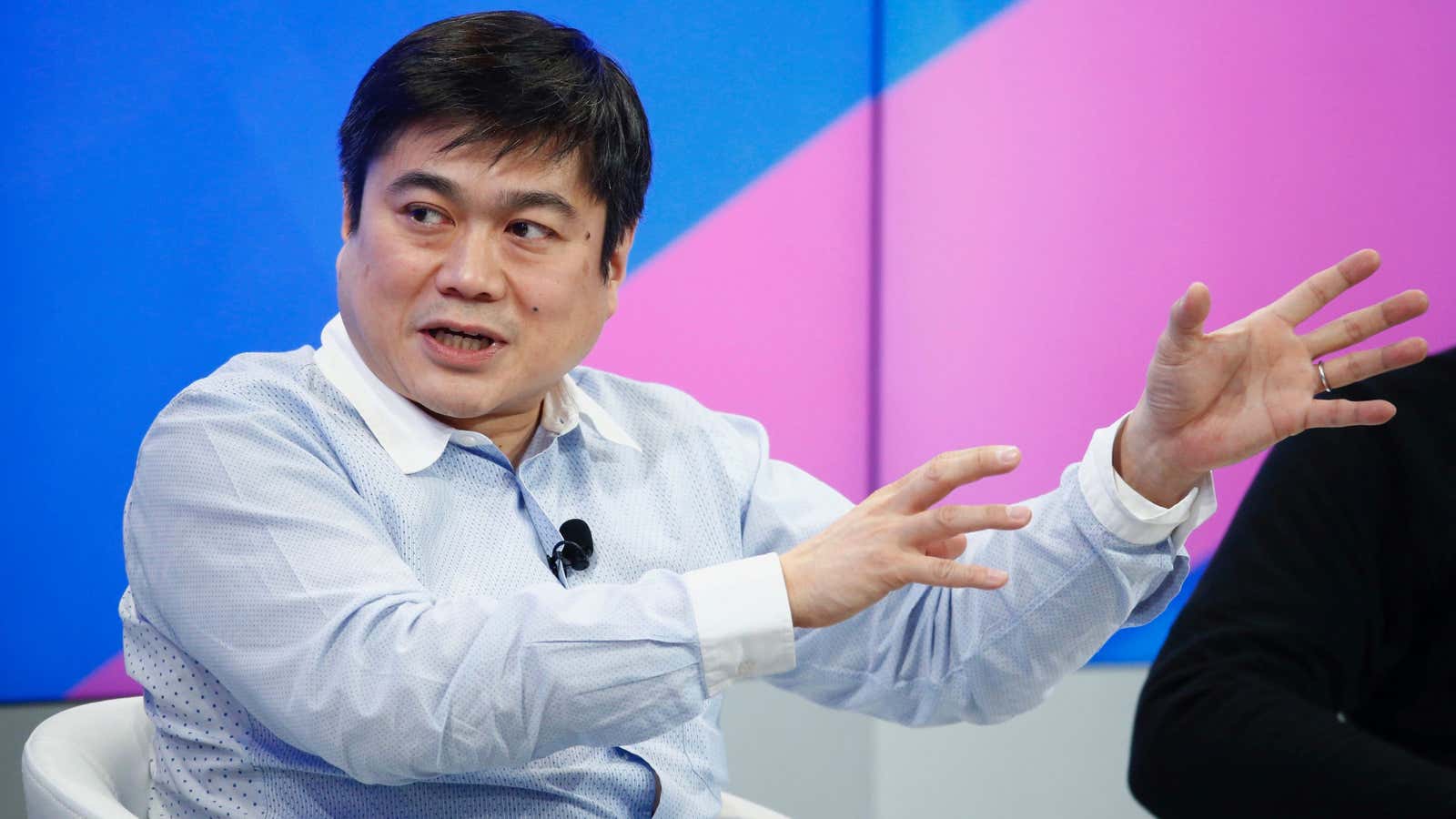Joichi Ito, director of MIT’s Media Lab, resigned Saturday (Sept. 7) after The New Yorker published an investigation into his attempts to conceal financial contributions from pedophile Jeffrey Epstein. Although Ito stewarded MIT’s lab, his work and legacy in the crypto community have largely passed under the radar.
Ito established the Digital Currency Initiative (DCI) at MIT, helping bitcoin survive some of its darkest days in 2015. That year, when the Bitcoin Foundation, a nonprofit dedicated to the cryptocurrency’s development faced “funding constraints,” the DCI welcomed bitcoin core developers Gavin Andresen, Cory Fields, and Wladimir van der Laan in full-time roles.
Since then, other members of DCI have left to work on Facebook’s Libra, and prominent contributors have created their own cryptos. Associate professor Christian Catalini, a principal investigator in MIT’s Digital Currencies Research Study, is now head economist for Calibra, Facebook’s crypto wallet, and professor Silvio Micali has since founded Algorand, a digital currency with a lottery-based consensus algorithm.
Ito’s departure from MIT raises questions about DCI’s past funding and its future direction. Given the Media Lab’s ties to Epstein, it’s fair to wonder whether the convicted sex offender—who was apparently intrigued by bitcoin—ever directed money to or within DCI. MIT’s Digital Currency Initiative didn’t immediately reply to a request for comment.
Despite his resignation, it’s also worth revisiting Ito’s crypto statements, especially in light of the Epstein revelations. Ito’s criticism of crypto entrepreneurs reflects as much on the blockchain industry’s fundraising abuse as it does his own.
Speaking with Neha Narula, the DCI’s director, in a video published September 2017, Ito chatted about open-source software development and initial coin offerings (i.e., crypto fundraisers). After Narula remarks that many open-source developers work for the love of their projects rather than money, she expresses astonishment at the billions of dollars gathered through crypto crowdfunding (10:45).
Ito replies:
“That’s the thing. Money corrupts.”
“I think the real problem with all this [blockchain and cryptocurrency development] is that cryptocurrencies are sort of fundamentally about money. It has this really weird dynamic of enticing people to take a path where they could see their work converted into cash.”
“It’s really hard not to take that [path] because if you have a family, you almost have a family responsibility to care about money.”
It’s easy to imagine Ito’s attitude extending to his own justifications for taking Epstein’s money. Later, while discussing the abuse of crypto crowdfunding, Ito notes: “A lot of stuff starts out bad.”
What can be said is that even though he accepted money from Epstein, Ito also provided the DCI with necessary skepticism around crypto. Through his blog and in op-eds, he worried about the effects of over-investment in blockchain and he expressed anxiety about the effects of putting money first.
“My concern with today’s ICOs is that they’re being fueled by the gold-rush mentality around cryptocurrencies, and so are deployed in irresponsible ways that are causing harm to individuals and damaging the ecosystem of developers and organizations,” he wrote in a February 2018 op-ed for Wired. “We haven’t set up the legal, technical, or normative controls yet, and many people are taking advantage of this.”
When, near the height of the 2017 bubble, a cryptocurrency called IOTA received glowing coverage from the MIT Technology Review, Ito dissected and dismissed the project’s claims. What’s disappointing is that Ito recognized abuse and hyperbole in the crypto community, but seems to have forgotten to apply the same standards to himself.
Read this: Why Bitcoin is and isn’t like the Internet (Joi Ito, 2015)
BITS AND PIECES
- Switzerland’s financial regulator published guidance on how it will approach Libra (FINMA)
- Why China’s rushing to mint its own digital currency (Bloomberg)
- ‘Progress is being made’ toward bitcoin ETF, SEC chair says (MarketWatch)
- When bitcoin bros talk hard news (Financial Times)
- Europe should ignore ‘treacherous promises’ of Facebook’s Libra currency: ECB’s Mersch (Reuters)
- Bitcoin futures on ICE grow nearer with custody warehouse start (Bloomberg)
Please send news, tips, and lab directors to privatekey@qz.com. Today’s Private Key was written by Matthew De Silva and edited by Mike Murphy. Alexander wept for there were no more worlds to conquer.




